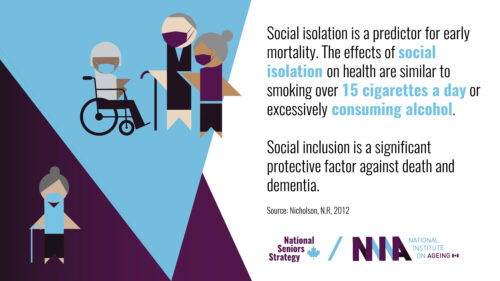The latest National Seniors Strategy (NSS) has been released and now includes a COVID-19 perspective.
The NSS is a report outlining the steps that should be taken by federal leadership to better support older Canadians. Dr. Sinha, co-chair of the National Institute of Ageing (NIA), tells CJRU about the updates to the third edition of the report, created by the institute.
“Healthcare in general is a provincial jurisdiction… but public transit is a municipal jurisdiction," says Dr. Sinha. "And the federal government itself has factors that it supports and can influence as well. That's why you realize that if you’re putting forward a comprehensive senior strategy that really addresses the wellbeing of older adults wherever might live in Canada, you actually need to have municipalities, provincial and territorial government and federal governments involved."

Infographic courtesy of National Institute on Ageing.
The third edition of the NSS was set to release in May, but Dr. Sinha says the team took some extra time to add a COVID-19 lens to the report. The NSS is composed of 14 evidence briefs that cover various policy issues relating to older Canadians. Some briefs are updated from the previous edition, some are more detailed and some are entirely new to the report. Dr. Sinha explains that many of the newer topics like emergency preparedness are a reference to the current scenarios Canadians are finding themselves in.
“When you look at natural disasters or an infectious disease pandemic, we can see that older Canadians are always the unprecedented victims of these issues. Right now we know that 97 per cent of Canadians that have died from COVID-19 are older Canadians, and we know that Canadians that die from floods or wildfires tend to be older,” he explains.
Social isolation is another area that has been given more attention in the latest report. While it has always been relevant within the NSS, the conversation has evolved with this year's restrictions to gathering, nursing home visitations and more.
Dr. Sinha is happy to see that the NSS is contributing to a shift in national priorities. In addition to the 14 evidence briefs, The NSS includes a progress report that outlines the various changes happening at a federal level, such as funding to address social isolation, enhanced pension plans, and more.
To learn more about the NSS, or read the full report, visit their website.
To hear more from Dr. Sinha, listen to the interview below and his previous segments around flu season and the consequences of underfunding long term care.


